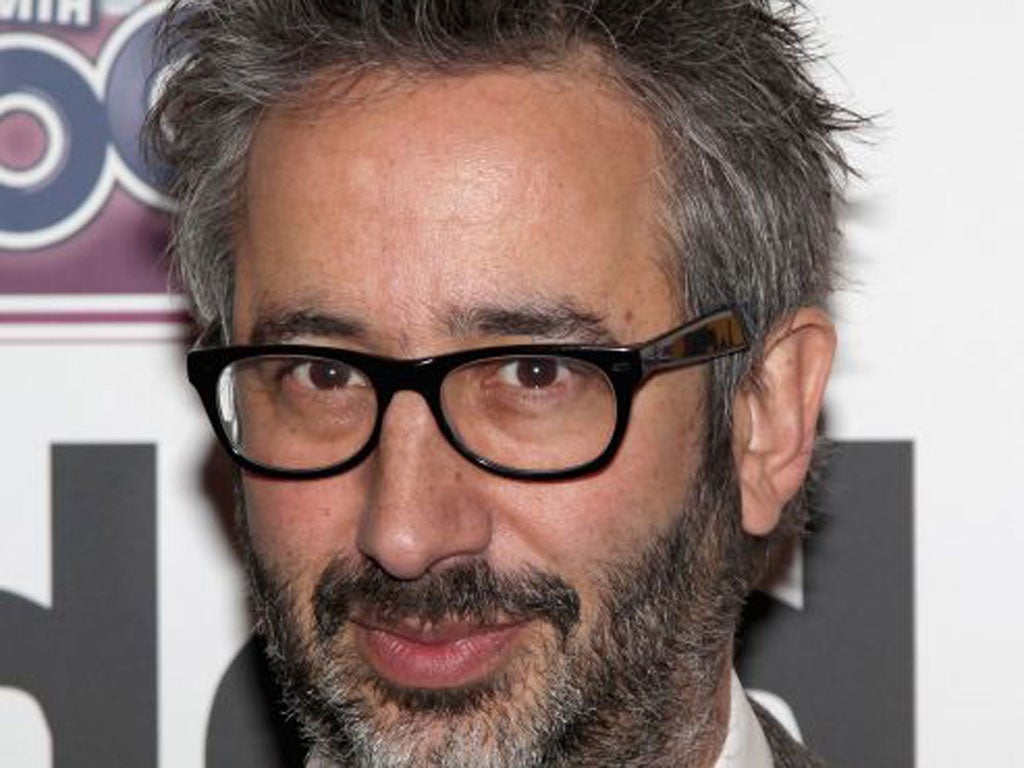Anonymity or fame, David Baddiel? You can’t have it both ways
To stand centre stage and then complain about it is contradictory

There can be few more perfect places for a famous person to contemplate the nature of fame than on the Edinburgh Fringe. It is there that many great actors and comedians launch their careers and later return, reminding the world that, for all their success, they are as grounded and in touch as they ever were.
It was a canny move, then, for David Baddiel, returning to stand-up comedy after a gap of 16 years, to choose celebrity as his theme. He takes a dim view of it. Publicising his Edinburgh Fringe show, he has won praise for admitting, with apparent modesty, that he is less well-known than he once was. Around Edinburgh, there are large posters of him, some of them quoting John Updike’s famous line about celebrity being the mask that eats into the face.
If you thought that using Updike to flog a comedy show was going it a bit, and indeed that there are a few contradictions involved in bolstering your public visibility with a routine that complains about it, you would be right. Talking about fame for an hour, David Baddiel is amiable and engaging enough, but far more interesting, if borderline creepy, is what emerges between the lines.
Being famous is addictive. It feeds on the desire to be recognised and liked, and even the most self-analytical of celebrities fail to see how much they need it.
Baddiel’s argument is not strikingly original, although it is unusual to hear it put forward by someone within the celebrity village. Fame makes people behave peculiarly and often nastily towards those who are well-known. The image which the world sees narrows the self, ironing out complexity and change, presenting a grotesquely inaccurate, out-of-date cliché. It is bad for those who see the mask, and worse for those behind it.
There is a problem here. David Baddiel reveals – unwittingly, one assumes – what happens to someone who has become used to, indeed dependent upon, being famous.
The business of telling stories which appear self-deprecating but are not – about hanging out with Russell Brand, or being insulted by Madonna, or being mistaken by Andrew Lloyd-Webber for Ben Elton – is part of the fame game. So is revealing the nastiness of online abuse, or the idiotic intrusions of members of the public into your private life, or the gormless things people say to you.
So is recounting an anecdote about how a groupie wanted you to say your famous comic catchphrase while you were having sex with her. So is talking about your family life and showing videos of your children as part of the stage act.
This behaviour and these anecdotes – whose subtext is, “I may be famous but I’m essentially as normal, vulnerable and screwed-up as anyone”– are the staple diet of gossipy chat-shows for a good reason. Any expression of modesty or embarrassment is trumped by fame; not acting like a celebrity is now a good celebrity trick.
For someone to present himself as a critic of fame, while playing that very game to the hilt, seems faintly bogus. Clearly, Baddiel could earn a living from his writing; he is an excellent and successful novelist and writer of screenplays. Privacy, as Updike argued, would make him better. He has chosen to remain in the public eye, because it feeds a neediness within him.
Fame tends to have the last word. You either aggressively avoid the limelight, or you stay within it, accepting its benefits and drawbacks.
To stand centre-stage, complaining about being there, is contradictory and undignified. A truer tag-line for Baddiel’s show would not have come from Updike but from Kingsley Amis: you can’t do both.
You can’t tell what’s Fringe and what isn’t
Daily life in Edinburgh can be like tripping out on a gentle hallucinogenic drug. Weird, otherworldly sights are never far away, and sometimes reality itself begins to bend.
After a lengthy wait for a monthly travelcard for the city’s buses, I reached the front of the queue, only for the printer to break down. The woman behind the counter blamed the effect of my photograph on the machine. Amidst general, good-hearted confusion, she said, “We’re basically a Fringe event in disguise. You’ve just paid £50 for the experience.”
Later, waiting to be seated in a restaurant, I was struck by the waiter’s similarity to Manuel in Fawlty Towers. That was because he was indeed Manuel in a play based on the TV series. I had wandered into the restaurant which was now the set.
This local haziness between reality and fiction is likely to last throughout the month, particularly – for me at least – at the Southside Cabaret Bar where tickets for my one-man show My Village and Other Aliens are, astonishingly, still available. If you happen to be in Edinburgh, come to the cabaret bar, old chum.
Twitter: @TerenceBlacker
Join our commenting forum
Join thought-provoking conversations, follow other Independent readers and see their replies
Comments
Bookmark popover
Removed from bookmarks